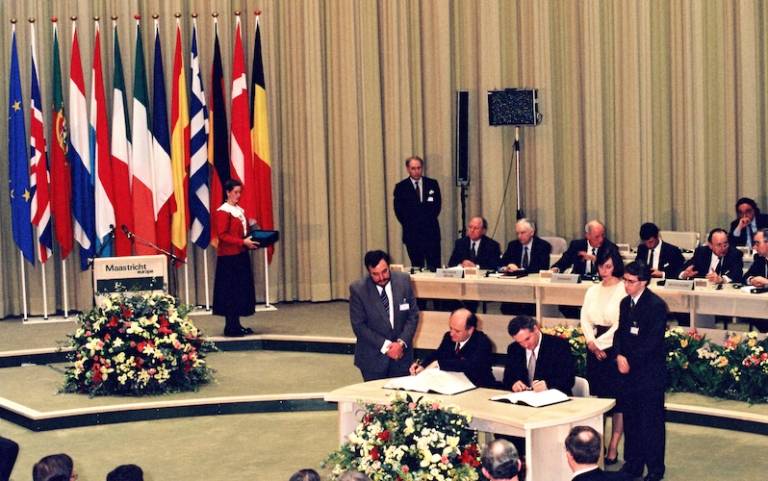Constitutional Identities

- The rationale
Article 2 TEU is not a mere statement of policy guidelines or intentions but contains values which … are an integral part of the very identity of the European Union as a common legal order, values which are given concrete expression in principles comprising legally binding obligations for the Member States.
CJEU, Poland v Parliament and Council, at 264. See also the similar statement in CJEU C156/21 of 16 February 2022 Commission v Hungary, at 127.
Will the EU come together or come apart? The EU understands itself as a “community based on the rule of law.”1 The CJEU was, perhaps unsurprisingly, among the first to officially articulate this self-understanding back in 1986.2 The principle of the rule of law (“RoL”) has since been enshrined in Art. 2 TEU in 2009, which asserts that the EU “is founded on the values of respect for human dignity, freedom, democracy, equality, the rule of law and respect for human rights” and which declares that these core values are “common to the Member States.” In language similar to Art. 2 TEU, also the Preamble to the Charter of Fundamental Rights of the EU (CFREU) proclaims that the EU “is founded on the indivisible, universal values of human dignity, freedom, equality and solidarity” and “based on the principles of democracy and the rule of law” and “places the individual at the heart of its activities …” Endorsement by each of the Member States of these core values—a precondition for EU membership3—is, according to the CJEU’s longstanding jurisprudence, the “fundamental premiss [which] implies and justifies the existence of mutual trust”4 between the diverse EU Member States. The RoL in this way is the glue holding the EU together and epitomizes the EU motto “united in diversity.”5 The centrality of the RoL is in continuity with the historical self-understanding and the constitutional identity of the EU as a peace project.
Yet, at the same time, the EU is obliged, under Art. 4 (2) TEU, to respect the “equality of Member States before the Treaties” and to respect their “national identities, inherent in their fundamental structures, political and constitutional.” There is an obvious tension between the universal dignitarian core values, on which the EU claims to be founded, on the one hand, and the particularistic cultural and national constitutional identities of EU Member States, on the other. This tension is today dramatically being brought to the fore by the upsurge, in various Member States, of populist governments, political parties, and movements claiming to authentically represent the will of the people expressed through elections. The limits of constitutional tolerance in the EU are constantly being tried and tested by those governments and movements claiming “nothing above / outside the will of the people” as their sole grundnorm.
This work-package explores institutional developments in the EU multilevel system in response to the populist challenge and underlying theoretical and normative concepts surrounding the idea of “constitutional identity,” which now occurs not only at the domestic but also at the EU-level.
AG Juliane Kokott has explained, "only a conception of national identity which is consistent with the fundamental values of the European Union as enshrined inter alia in Article 2 TEU may be protected under Article 4(2) TEU.”6 On the one hand, the identity limitation in Art. 4(2) TEU “does not simply refer to interpretations of the constitutional law of the Member States but … introduces an autonomous concept of EU law the interpretation of which is a matter for the Court.” On the other hand, the meaning of identity as an autonomous concept “by its very nature, cannot be determined without taking into account the Member States’ own conceptions of their national identities”7—but always within the framework of Art. 2 TEU and therefore in ways that express fidelity to the EU motto “united in diversity”.8
In this way, the core framework values expressed in Art. 2 TEU serve as what one may call an overarching “EU political principle of legitimacy;” principle which provides normative justification for the primacy claims of EU law over domestic law and a litmus-test for the boundaries of EU constitutional tolerance towards national-identity claims (each imbued with historical experience and reflective of discrete democratic choice) by the diverse Member States. The EU political principle of legitimacy requires EU-friendliness (as qualified by Art. 2 TEU values) to be an integral part of the Member States’ constitutional identities. Yet, at the same time, judicial concretisation by the CJEU of the open-textured, highly abstract constitutional-identity-conferring framework Art. 2 TEU values must be “Member-State-friendly”—that is, constitutionally tolerant toward the legitimate diversity of national constitutional identities within a shared, constitutionally-tolerant framework. The EU’s claim to constitutional identity must never be “too thick” nor “too thin”—the claim must be robust enough to rule out ethnocultural closure and prejudice, but also be democracy-friendly and non-metaphysical. The remedy to autocracy and closed societies is not isolation of wayward Member States, but their constant exposure to European integration. This constructively exploits the fact that even countries that are backsliding are not ethnoculturally closed, monolithic blocs (or "demoi"), but internally conflicted and divided, with large swathes of the populations being, indeed, pro-European and pro-liberal. Spillovers genius of EU law
The work-package is aimed at exploring this conundrum, in the light of institutional and jurisprudential developments in the context of the protection of the institutional guarantee of judicial independence, but also same-sex marriage and parenthood, religious freedom, and the independence of civil society.
Project leads
Image: Gerard Collins and Bertie Ahern, seated in front from left to right, signing the treaty sof Maastricht on behalf of Ireland, 07/02/1992, European Communities, 1992, Copyright, Source: EC - Audiovisual Service.

 Close
Close



